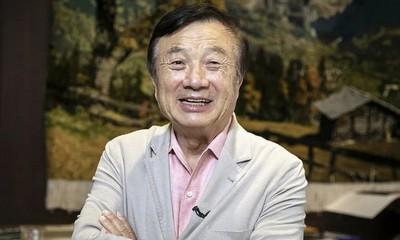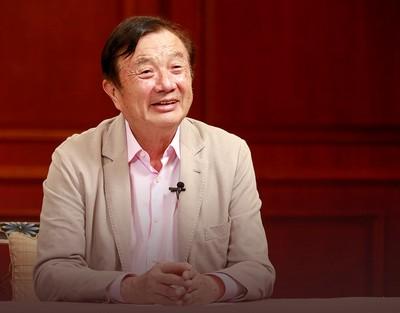
Why the interview with Ren Zhengfei went viral
Global Times
On June 10, the People’s Daily published an exclusive interview with Huawei CEO Ren Zhengfei on its front page. When talking about facing external blockades and suppression, Ren said, “Don’t dwell on difficulties, just take action and move forward step by step.” He also called on the whole society to support theoretical research, whose contributions “may only be recognized after decades or even centuries,” and to maintain strategic patience with theoretical scientists. As a Chinese entrepreneur, Ren’s confidence in “unswervingly managing own affairs well,” his open-mindedness that “the more open the country becomes, the more it will drive our progress,” and his determination to anchor the forefront of scientific and technological development and adhere to long-termism have sparked widespread resonance across all sectors of society.
As we all know, Huawei has long been sanctioned and suppressed by the US and some other Western countries from chips to 5G technology. Not long ago, Huawei’s Ascend chip encountered groundless “warnings” from the US about its “risks.” But Huawei “moved forward step by step” and overcame one difficulty after another.
This reflects a value consensus that is increasingly gathering in Chinese society: Moving from the semiconductor field that was once under “stranglehold” to the forefront of the most competitive technological fields such as artificial intelligence and basic scientific research, China’s leapfrog progress has never been based on momentary passion, but on tireless efforts to reach long-term goals. It is precisely by insisting on doing “difficult but right things” that gave Huawei the confidence to not only “survive” in the face of suppression and blockade, but to actually break foreign stranglehold in fields such as chips and operating systems. This is also a vivid display of “managing our own affairs well.”

“The more open the country, the more it will drive our progress.” It should also be recognized that, in the current environment, the growth and success of private enterprises like Huawei would not be possible without the strong support of China’s vast and complete industrial system, infrastructure, talent pool, and institutional safeguards. It also relies on the building of a business environment governed by market principles, the rule of law, and internationalization.
In the span of seven years, the Communist Party of China (CPC) Central Committee has held two symposiums with private enterprises to help ease their difficulties, boost confidence, and map out development blueprints. Just last month, the Private Sector Promotion Law officially came into effect. Comprising nine chapters and 78 articles, the law aims to continuously improve the development environment for the private sector across multiple dimensions such as fairness, regulation, services, and protection, setting many precedents in the process.
The principle of the “two unswervingly” has now been written into law and has been repeatedly stressed in the Party’s documents, providing private enterprises and entrepreneurs with long-term institutional confidence. The alignment between national top-level planning and the needs of enterprise development serves as the most solid foundation for overcoming blockades and withstanding risks.
The Chinese society’s increasing emphasis on R&D investment over the years also reflect the strong social consensus of “managing our own affairs well.” According to a report Huawei published on its official website in April this year, Huawei’s R&D investment in 2024 reached 179.7 billion yuan, up 9.1 percent year-on-year, accounting for 20.8 percent of its sales revenue.
According to data from the National Bureau of Statistics, China’s total national expenditure on research and experimental development (R&D) in 2024 exceeded 3.6 trillion yuan, reaching 3.613 trillion yuan, an 8.3 percent increase from the previous year, maintaining its position as the world’s second-largest R&D investor.
China’s R&D investment intensity reached 2.68 percent, ranking 12th among major countries worldwide, surpassing the EU’s average of 2.11 percent, and further closing in on the OECD average of 2.73 percent.
The World Intellectual Property Organization’s recently released Global Innovation Index 2024 showed that China’s global innovation ranking rose by one place to 11th compared to the previous year, making it one of the fastest-growing economies in innovation over the past decade.
Many Western media outlets, including Reuters and Bloomberg, have viewed Reng’s exclusive interview through the lens of China-US competition and the ongoing China-US economic and trade negotiations. While such a perspective is not so strange, it somewhat narrows the understanding of China’s development logic.
Looking solely at the recent achievements of Chinese companies – from DeepSeek to Xiaomi’s Xuanjie chip and Huawei’s fully “homegrown” HarmonyOS computers – whether breakthroughs in key technologies or cluster-style innovation across multiple fields, these are fundamentally natural outcomes from the combination of national strategy and market rules, which help the society to run more efficiently, make the industry more dynamic, and make people’s lives more convenient. This reflects China’s national conditions and system.
Ren’s statement that “one of the core purposes of socialism is to advance societal development” captures this simple but profound logic. This is also the source of China’s determination and confidence in dealing with various risks and challenges.
“On the new journey of the new era, the private economy has broad development prospects and immense potential, and it is the perfect time for private companies and entrepreneurs to fully demonstrate their prowess.” The important speech delivered by Xi Jinping, general secretary of the CPC Central Committee, at a symposium on private enterprises on February 17 contained high expectations for private enterprises.
As a representative of private entrepreneurs, behind Ren’s statement of “don’t dwell on difficulties, just take action” going viral is the collective admiration of countless Chinese people for the spirit of “hard work leads to victory” and the firm confidence in winning the future through struggle.
Today, China needs not only to “take action,” but to do it with determination, endurance and direction. When the world is full of uncertainty, this long-termism and spirit of struggle based on hard work is the basis for China to overcome the storms and move toward rejuvenation.
